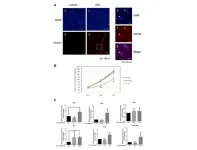(Press-News.org) HOUSTON ― Incorporating navy beans into the diet of colorectal cancer (CRC) survivors has the potential to positively impact both gut and host health by modulating markers linked to obesity and disease, according to new research from The University of Texas MD Anderson Cancer Center.
The findings published today in eBIOMedicine, part of The Lancet family of journals, revealed BE GONE trial participants who added a cup of navy beans daily to their regular meals saw positive changes in their gut microbiome, which is associated with cancer prevention and improved treatment outcomes. Changes included an increase of alpha diversity, or beneficial bacteria (Faecalibacterium, Eubacterium and Bifidobacterium) and a decrease in pathogenic, or opportunistic, bacteria.
“Observing a shift in microbiome diversity with diet intervention alone is rare, and this study underscores the ability of a readily available prebiotic food to bring about such changes,” said corresponding author Carrie Daniel-MacDougall, Ph.D., associate professor of Epidemiology. “Over the course of eight weeks, there was an improvement in participants' gut health, marked by an increase in beneficial bacteria, which wards off the harmful bacteria.”
Obesity, poor diet, or gastrointestinal issues can cause disturbances in a person's normal microbial balance. For people who have had or have CRC, these changes cause inflammation and can affect survival. Even after cancer treatment or precancerous polyp removal, a poor diet and an unbalanced gut microbiome can have negative effects on prevention efforts for both cardiovascular disease and cancer.
Beans, particularly small white navy beans, are full of gut-supporting fibers, amino acids, and other nutrients, which can help the beneficial bacteria in your colon flourish, supporting immune health and regulating inflammation, Daniel-MacDougall explains. Despite being accessible and cost-effective, the legumes are frequently avoided by Americans due to mild or acute gastrointestinal side effects, which can be mitigated by proper preparation and consistent consumption.
Daniel-MacDougall cautions that individuals should not attempt this diet without speaking to a physician, as it could have negative impacts without proper guidance. Further study is needed in order to determine how dietary changes can be used to lower cancer risk or improve treatment outcomes.
The randomized BE GONE trial followed 48 men and women over age 30 who met the criteria for obesity via body mass index (BMI) or waist size and who had a history of bowel lesions. This included patients with a history of CRC (75%) and/or high-risk, precancerous polyps of the colon or rectum detected at colonoscopy. For eight weeks, participants either followed their regular diet or included a daily cup of organic, canned pressure-cooked white navy beans.
Patients were able to choose and prepare their own meals, with close follow-up and counseling from the study dietitian. Every four weeks, participants provided stool and fasting blood samples to assess shifts in the gut microbiome as well as host metabolites and markers. Participants were considered adherent if they consumed at least 80% of the beans over the intervention period and followed the prescribed regimen at least five days a week. Limitations of this study include participant aversion to continually consuming navy beans. No serious side effects were reported.
“The beans did not appear to induce gut inflammation or seriously impact bowel habits, which is crucial for CRC survivors and patients,” Daniel-MacDougall said. “However, once participants stopped eating the beans, the positive effects faded quickly, highlighting the need to educate patients on how to maintain healthy habits.”
The study highlights the therapeutic role of naturally prebiotic-rich foods, while further emphasizing the need for consistent and sustainable dietary adjustments for high-risk cancer patients. In the next steps, researchers will focus on a wider variety of prebiotic foods and how changes to the microbiome affect patients undergoing immunotherapy.
The trial was funded by the American Cancer Society, with initial support from an MD Anderson Institutional Research Grant. Additional funding support was provided by the National Cancer Institute (NCI) (P30 CA016672), the Andrew Sabin Family Fellowship Program, the Cancer Prevention and Research Institute of Texas (CPRIT) (RP160097), and MD Anderson’s Moon Shots Program®. Study beans were independently purchased with funds from the Dry Bean Health Research Program, a peer-reviewed incentive award created by the Northarvest Bean Growers Association, Communique Inc. to identify and encourage researchers that apply for NIH-funding to support studies on beans and human health. A full list of co-authors and disclosures can be found here.
END
Eating beans improves gut health, regulates immune and inflammatory processes in colorectal cancer survivors
Adding navy beans to diet diversified gut microbiome which could aid in cancer prevention and treatment
2023-12-01
ELSE PRESS RELEASES FROM THIS DATE:
One of the largest magnetic storms in history quantified: Aurorae covered much of the night sky from the Tropics to the Polar Regions
2023-12-01
In early November of this year, aurora borealis were observed at surprisingly low latitudes, as far south as Italy and Texas. Such phenomena indicate the impacts of a solar coronal mass ejection on the Earth's magnetic field and atmosphere. Far more dramatic than this recent light show was, it was nothing compared to a huge solar storm in February 872. The resulting auroral display from that event ringed the globe and produced auroras observed in sites as close to the equator as Bombay and Khartoum. An international team consisting of scientists from nine counties has now published a detailed study of this historically important event, tracing its ...
Consensus needed on when global warming reaches 1.5°C
2023-12-01
Writing in the journal Nature ahead of COP28, a team of Met Office scientists has emphasised that – surprisingly – there is currently no formally agreed way of defining the current level of global warming relevant to the Paris Agreement.
They have proposed a solution.
While the global average temperature in a particular year is well-known, this will not be suitable as an indicator of whether the “Paris 1.5” has been breached or not, because the Paris Agreement refers to long-term warming, not individual years.
But no alternative has yet been formally agreed.
Without ...
Study identifies barriers that limit young men at HIV risk from taking preventative drug
2023-12-01
Results of a qualitative research study into the uptake of PrEP - a drug which stops HIV infecting the body - suggests that more needs to be done to breakdown barriers to access for the potentially lifesaving medication.
Research published in the Journal of Prevention and Health Promotion from a team at the University of Bath finds that knowledge and awareness among young men who have sex with other men about the drug is low and there is often stigma associated with being prescribed PrEP.
Pre-exposure prophylaxis ‘PrEP’ refers to a pill that prevents HIV contraction in HIV-negative individuals. PrEP ...
New project investigating how aerosols could affect climate change in near future
2023-12-01
A researcher from The University of Texas at Austin has received a grant from the National Oceanic and Atmospheric Administration (NOAA) to study how changing aerosol pollution could influence climate change in the United States in the coming decades.
Aerosols are tiny solid particles and liquid droplets that contribute to smog and are emitted from industrial factories, power plants and vehicle tailpipes, as well as natural sources like volcanic eruptions. These small particles can influence the Earth’s climate by reflecting or absorbing sunlight and changing the behavior of clouds.
Geeta ...
Physicians, scientists agree increased East-West travel has negative impacts on student-athletes through sleep and circadian disruption
2023-12-01
Announcements in June 2022 of possible realignments of major east-west athletic conferences raised concern among many sleep and circadian physicians and scientists across the United States. As a result of such changes, student-athletes would suffer the negative consequences of increased travel—especially with travel that that crosses time zones and induces jet lag.
Because of the concern over the demise of the Pac12, leading to more east-west trips, a group of sleep and circadian scientists and physicians have published a white paper ...
Arizona State, Idaho National Laboratory team to boost clean energy research
2023-12-01
Idaho National Laboratory (INL) and Arizona State University (ASU) have agreed to expand their joint efforts in clean energy research for the next five years. An agreement signed in October establishes a framework for both institutions to develop low-carbon processes for the energy and manufacturing sectors.
One joint project works to improve and decarbonize methods to extract critical minerals needed for renewable energy generation, energy storage and high-tech electronics. Another effort will develop solutions to electrify process heating, a major pathway to decarbonizing heavy manufacturing.
Researchers from INL and ASU have previously ...
New bottlenose dolphin sense discovered: they feel electricity
2023-12-01
Born tail first, bottlenose dolphin calves emerge equipped with two slender rows of whiskers along their beak-like snouts – much like the touch-sensitive whiskers of seals. But the whiskers fall out soon after birth, leaving the youngster with a series of dimples, known as vibrissal pits. Recently Tim Hüttner and Guido Dehnhardt, from University of Rostock, Germany, began to suspect that the dimples may be more than just a relic. Could they allow adult bottlenose dolphins to sense weak electric fields? Taking an initial close look, they realised that the remnant pits resemble ...
Genomic study sheds light on how carnivorous Asian pitcher plants acquired signature insect trap
2023-11-30
BUFFALO, N.Y. — Possessing more than two complete sets of chromosomes can be a hindrance to long-term survival of a plant lineage, yet scientists are also finding evidence it’s likely behind some evolutionary innovation.
Sudden inheritance of whole suites of extra gene copies can add redundancy to an organism's regular sets of functions, actually permitting some of those copies to evolve and express in entirely new ways.
In the case of the East Asian pitcher plant, this mutational freedom may have even fine-turned its ability to capture prey and satisfy its appetite for “meat.”
That’s just one of the findings ...
Harnessing the power of a parasite that can stop pain
2023-11-30
COLUMBUS, Ohio – For the first time, scientists have begun to figure out why the disfiguring skin lesions caused by cutaneous leishmaniasis don’t hurt.
Researchers analyzed leishmaniasis lesions on mouse skin to detect metabolic signaling pathways that differed from uninfected mice. Results suggested the parasites that cause the disease change pain perception – presumably as a way to delay treatment and promote their own survival.
“No one knows why these lesions are painless – ...
Aging modulates extracellular vesicles of epidermal keratinocytes
2023-11-30
“In this article, we describe for the first time the impact of chronological aging on EVs production by human keratinocytes.”
BUFFALO, NY- November 30, 2023 – A new research paper was published on the cover of Aging (listed by MEDLINE/PubMed as "Aging (Albany NY)" and "Aging-US" by Web of Science) Volume 15, Issue 22, entitled, “Chronological aging impacts abundance, function and microRNA content of extracellular vesicles produced by human epidermal keratinocytes.”
The disturbance of intercellular communication is one of the hallmarks of aging. In their new study, researchers ...
LAST 30 PRESS RELEASES:
Scientists reveal our best- and worst-case scenarios for a warming Antarctica
Cleaner fish show intelligence typical of mammals
AABNet and partners launch landmark guide on the conservation of African livestock genetic resources and sustainable breeding strategies
Produce hydrogen and oxygen simultaneously from a single atom! Achieve carbon neutrality with an 'All-in-one' single-atom water electrolysis catalyst
Sleep loss linked to higher atrial fibrillation risk in working-age adults
Visible light-driven deracemization of α-aryl ketones synergistically catalyzed by thiophenols and chiral phosphoric acid
Most AI bots lack basic safety disclosures, study finds
How competitive gaming on discord fosters social connections
CU Anschutz School of Medicine receives best ranking in NIH funding in 20 years
Mayo Clinic opens patient information office in Cayman Islands
Phonon lasers unlock ultrabroadband acoustic frequency combs
Babies with an increased likelihood of autism may struggle to settle into deep, restorative sleep, according to a new study from the University of East Anglia.
National Reactor Innovation Center opens Molten Salt Thermophysical Examination Capability at INL
International Progressive MS Alliance awards €6.9 million to three studies researching therapies to address common symptoms of progressive MS
Can your soil’s color predict its health?
Biochar nanomaterials could transform medicine, energy, and climate solutions
Turning waste into power: scientists convert discarded phone batteries and industrial lignin into high-performance sodium battery materials
PhD student maps mysterious upper atmosphere of Uranus for the first time
Idaho National Laboratory to accelerate nuclear energy deployment with NVIDIA AI through the Genesis Mission
Blood test could help guide treatment decisions in germ cell tumors
New ‘scimitar-crested’ Spinosaurus species discovered in the central Sahara
“Cyborg” pancreatic organoids can monitor the maturation of islet cells
Technique to extract concepts from AI models can help steer and monitor model outputs
Study clarifies the cancer genome in domestic cats
Crested Spinosaurus fossil was aquatic, but lived 1,000 kilometers from the Tethys Sea
MULTI-evolve: Rapid evolution of complex multi-mutant proteins
A new method to steer AI output uncovers vulnerabilities and potential improvements
Why some objects in space look like snowmen
Flickering glacial climate may have shaped early human evolution
First AHA/ACC acute pulmonary embolism guideline: prompt diagnosis and treatment are key
[Press-News.org] Eating beans improves gut health, regulates immune and inflammatory processes in colorectal cancer survivorsAdding navy beans to diet diversified gut microbiome which could aid in cancer prevention and treatment






